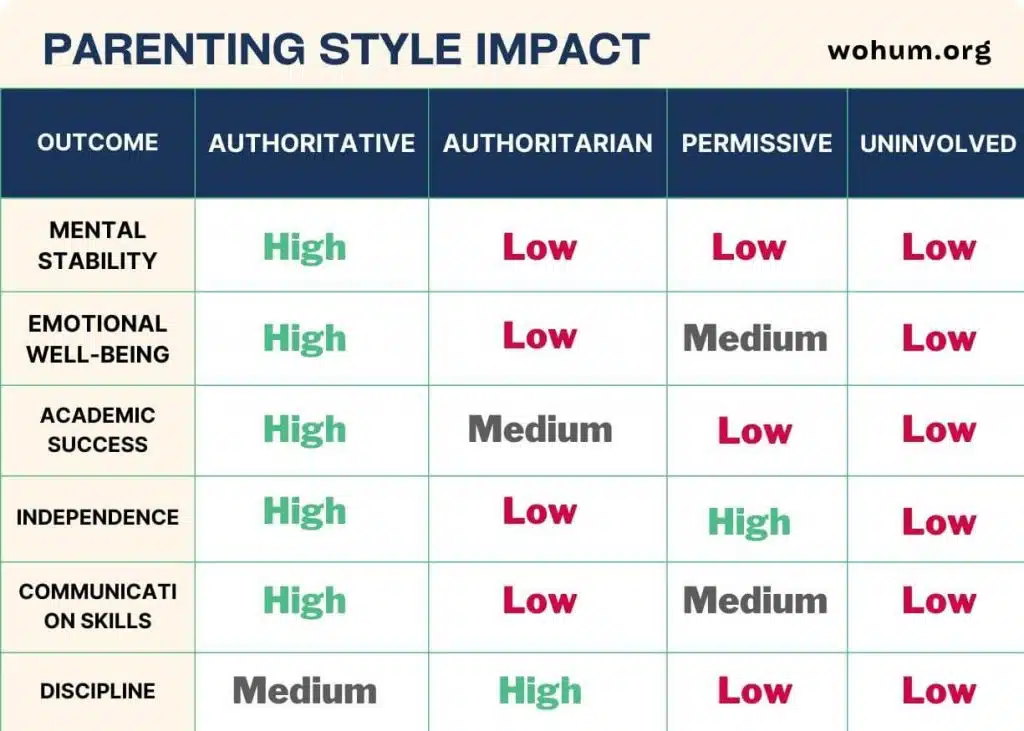Child Raising Methods and Their Profound Impact on Children


Embarking on the journey of parenthood is a profound adventure filled with boundless love, endless joy, and occasional challenges. As parents, we are united by a common desire – to provide the very best for our children. In this grand voyage, one critical factor stands out like a guiding star: our choice of child raising methods.
Picture parenting methods as the compass that points us in the right direction and charts the course for our children’s future. These methods influence how we nurture, discipline, and communicate with our little ones. Essentially, they form the bedrock upon which our children’s lives are built. So, let’s embark on this exploration of child raising methods, illuminating the path to effective parenting.
These are parenting styles often discussed in the field of developmental psychology, and parenting can be grouped into four primary categories: Authoritarian, Authoritative, Permissive, and Uninvolved parenting.
Modern child raising approaches have evolved to address the dynamic challenges and shifts in societal norms and values. They often incorporate findings from recent research in developmental psychology, neuroscience, and education. These modern approaches include Attachment parenting, Helicopter parenting, Free-range parenting, and Mindful Parenting.
These out-of-the-box methods challenge the norms. They are like the rebels of the parenting world and include Lighthouse, Reflective, Slow Parenting, Off-the-Grid Parenting, and Nature-Centric Parenting.
Cultural diversity enriches the tapestry of parenting styles, with countries like Japan, Finland, and Africa each offering unique child-raising approaches that reflect their deeply rooted values and traditions.
This article will explore these approaches, highlighting what makes them unique and how they can affect children’s development. So, whether you’re a parent, soon-to-be parent, or just curious, you’ll gain insights into the fascinating world of child-rearing and decide what approach feels suitable for you and your family.
Authoritarian parenting is the strictest of the bunch. In these households, parents lay down the law and expect unwavering obedience. Rules are non-negotiable, and disobedience often results in punishment.
Effects on Children
Authoritative parenting is all about balance. Parents set clear expectations and rules, but they also foster warmth, understanding, and open communication.
Effects on Children
Permissive parenting is on the opposite end of the spectrum. Rules are often lax, and parents are indulgent, avoiding discipline.
Effects on Children
Uninvolved parenting is when parents are emotionally distant and detached from their child’s life, often due to personal issues or neglect.
Effects on Children

Attachment parenting revolves around building strong emotional bonds between parents and their children. Key characteristics include:
Effects on Children
Attachment parenting can have positive effects on children, including:
Discover our article if you want to learn promoting secure attachment.
Helicopter parenting involves hovering over a child, constantly monitoring and being overly involved in their lives. Key characteristics include:
Effects on Children
While helicopter parents may have good intentions, their approach can have mixed effects on children, including:
Free-range parenting encourages independence and self-reliance in children. Key characteristics include:
Effects on Children
Free-range parenting can have both positive and negative effects on children, including:
Mindful parenting is about being fully present and attuned to your child’s emotions and needs in every moment. Key characteristics include:
Effects on Children
Practicing mindful parenting can influence children in various ways, such as:
As we journey deeper into the realm of child raising methods, we come across alternative approaches that defy convention. These methods offer a unique perspective on parenting, challenging established norms and encouraging parents to explore new paths. Let’s delve into five such alternative approaches:
Lighthouse parenting is all about providing guidance and support while allowing children the freedom to navigate their paths. Key characteristics include:
Effects on Children
Lighthouse parenting can have positive effects on children, including:
Reflective parenting emphasizes self-awareness and understanding between parents and children. Key characteristics include:
Effects on Children
Reflective parenting can have profound effects on children, including:
Slow parenting is about embracing a simpler, more mindful approach to parenting. Key characteristics include:
Effects on Children
Slow parenting can have positive effects on children, including:
Off-the-grid parenting involves disconnecting from technology and embracing a more natural, hands-on approach to parenting. Key characteristics include:
Effects on Children
Off-the-grid parenting can have both positive and negative effects on children, including:
Nature-centric parenting places a strong emphasis on connecting children with the natural world. Key characteristics include:
Effects on Children
Nature-centric parenting can have positive effects on children, including:
Explore our related article if you wish to learn more about the benefits of nature play.
Parenting is a universal experience, yet the methods and approaches to raising children can vary greatly from one corner of the globe to another. Different cultures and traditions shape the way parents nurture and guide their children, and these diverse methods can have a profound impact on a child’s upbringing. Let’s take a worldwide journey to explore some distinctive child-raising methods and their effects:
In Chinese culture, discipline and academic success often take center stage. Parents place a strong emphasis on rigorous education and discipline. It’s not uncommon for children to have long study hours and strict rules at home.
Effects on Children:
Japanese parenting emphasizes respect for elders, authority and fosters independence from an early age. Children are encouraged to take responsibility for their actions and decisions.
Effects on Children:
In Nordic countries like Sweden, Norway, and Denmark, there’s a strong tradition of allowing children plenty of time outdoors to explore and play independently, even in challenging weather conditions.
Effects on Children:
Finland is renowned for its education system, which places a premium on play, creativity, and minimal homework. Children have shorter school hours and ample time for unstructured play.
Effects on Children:
Many African cultures prioritize community values, collective responsibility, and a strong sense of belonging. Children are expected to contribute to the family and community from a young age.
Effects on Children:
Now comes the big question: Which child raising method is the best? Many experts tend to favor authoritative parenting. This method strikes a balance between setting rules and being warm and understanding. It encourages open communication, sets clear expectations, and provides guidance while respecting a child’s individuality.
Why is authoritative parenting often seen as the best? Because it tends to foster healthy, well-rounded children. Kids raised this way often have good self-esteem, social skills, and independence. There are numerous adverse effects associated with other traditional parenting approaches, which is why the authoritative parenting method should be preferred over them.
It’s worth noting that you can also blend authoritative parenting with elements from modern and alternative approaches that have shown positive effects. The key lies in striking a balance and crafting a well-thought-out parenting style that harmonizes with your family’s unique dynamics.
If you ever face challenges or uncertainties along this rewarding journey, don’t hesitate to seek professional guidance and support. Parenting is a profound responsibility, and reaching out for help when needed is a sign of strength and commitment to your child’s well-being.
Parenting methods have an incredible impact on our children’s lives. They shape their character, influence their choices, and prepare them for the world.
Authoritative parenting is preferred when considering child raising methods because it nurtures well-adjusted children. Your family’s unique needs and values should guide your choice, but remember that your love, care, and dedication matter more than any specific method. As you embark on this remarkable parenting journey, adapting and evolving will be your greatest strengths.
Parenting is a journey; as our world changes, so do our methods. It’s important to remain open to new ideas and approaches, always striving to provide the best environment for our children’s growth and happiness.
Ultimately, what truly matters is the love, care, and dedication parents bring. Regardless of the approach chosen, a supportive and nurturing environment sets the stage for our children’s bright futures.
References:

Get Your Resources to Your Email Now!